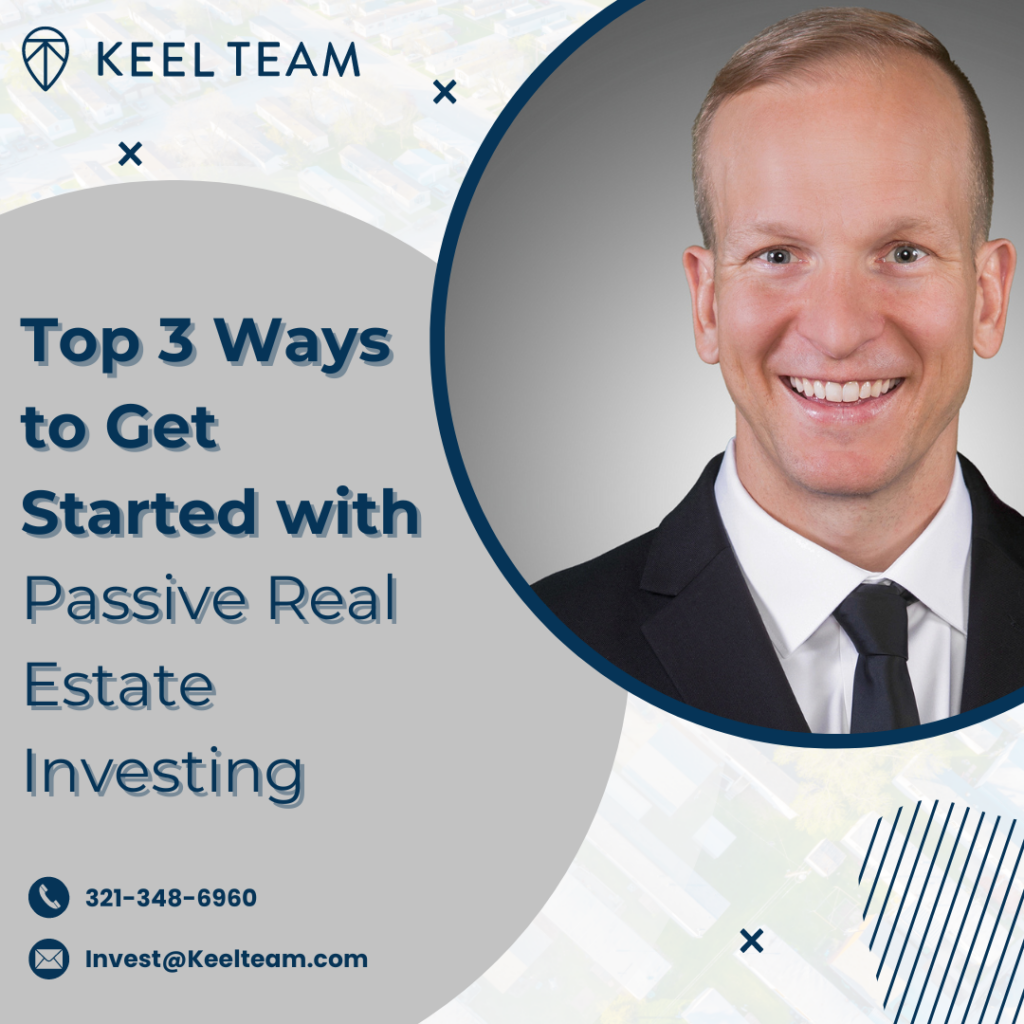Top 3 Ways to Get Started with Passive Real Estate Investing
-
 Andrew Keel
Andrew Keel

Introduction into Passive Real Estate Investing
Passive real estate investing is one of the most popular and lucrative ways to generate passive income. However, not everyone has the time, money, or expertise to buy, manage, and sell properties on their own. Fortunately, there are several ways to invest in real estate without being actively involved in the day-to-day operations. Here are three of them:
1. Limited Partner (LP) Investments into Mobile Home Park Syndications
A syndication is a group of investors who pool their money together to buy a large property, such as a mobile home park, that they could not afford individually. The syndicator, or the general partner (GP), is the one who finds, acquires, and manages the property, while the limited partners (LPs) are the passive investors who provide the capital and receive a share of the profits.
Mobile home park syndications are attractive for passive investors because they offer potentially high returns due to the strong demand for affordable housing in the US. According to the US Census Bureau, there are over 8.5 million mobile homes in the country, and the average rent for a mobile home lot is $280 per month. Mobile home parks also have low maintenance costs, low vacancy rates, and high barriers to entry, making them a stable and resilient asset class.
As an LP in a mobile home park syndication, you can expect to receive monthly or quarterly cash flow distributions, as well as a portion of the capital gains when the property is sold. The typical holding period for a syndication is 5 to 10 years, and the average annual return on investment (ROI) ranges from 10% to 20%.
However, before investing in a mobile home park syndication, you need to do your due diligence on the GP and the property. You should look for a GP who has a proven track record of successful syndications, a clear business plan, and a transparent communication style. You should also evaluate the property’s location, market, condition, occupancy, income, expenses, and potential for growth.
2. Buying a Turnkey Single Family Rental
A turnkey property is a fully renovated and rented property that is ready for an investor to buy and start collecting rent. Turnkey properties are usually sold by specialized companies that find, fix, and lease properties in different markets across the country. These companies also offer property management services, so the investor does not have to worry about finding tenants, collecting rent, or handling maintenance issues.
Buying a turnkey single family rental is a simple and convenient way to invest in real estate passively. You can benefit from the appreciation of the property value, the tax advantages of owning real estate, and the steady cash flow from the rent. The average annual ROI for a turnkey property is around 8% to 12%.
However, buying a turnkey property also has some drawbacks. You have to pay a premium price for the property, which may reduce your cash flow and equity. You also have to rely on the turnkey company’s quality of work, honesty, and competence. Therefore, you need to do your research on the turnkey company and the property before buying. You should check the company’s reputation, reviews, and references. You should also inspect the property’s condition, location, and financial performance.
Download my free eBook on the “Top 10 Things to Review When Considering a Passive Mobile Home Park Investment “
By Andrew Keel

3. Investing in a Publicly Traded REIT
A real estate investment trust (REIT) is a company that owns, operates, and finances income-producing real estate properties. REITs are required by law to distribute at least 90% of their taxable income to shareholders as dividends. By investing in a publicly traded REIT, you can own a slice of a diversified portfolio of real estate properties without having to buy or manage them yourself.
Investing in a publicly traded REIT is the easiest and most accessible way to invest in real estate passively. You can buy and sell REIT shares on the stock market, just like any other stock. You can also choose from different types of REITs, such as residential, commercial, industrial, or mortgage REITs, depending on your risk and return preferences. The average annual ROI for a publicly traded REIT is around 10% to 15%.
However, investing in a publicly traded REIT also has some disadvantages. You have to pay taxes on the dividends and capital gains, which may reduce your net return. You also have to deal with the volatility and unpredictability of the stock market, which may affect the value and performance of your REIT shares. Therefore, you need to do your analysis on the REIT and the market before investing. You should look for a REIT that has a strong balance sheet, a consistent dividend history, and a competitive edge in its niche.
Conclusion
There are many options when it comes to passive real estate investing. Whether you choose to invest in a mobile home park syndication, a turnkey single family rental, or a publicly traded REIT, you can enjoy the benefits of owning real estate without being actively involved in the management. However, with whatever path you choose, it’s important to do your due diligence on the operator and the property to ensure they have a proven track record in the business model they choose in order to be successful.
At Keel Team Mobile Home Park Investments, our commitment extends beyond mere investment. We strive to improve the quality of life in our mobile home communities while simultaneously delivering substantial returns to our limited partner investors. For more information on our investment strategy or to learn more, please feel free to contact us using the provided details below.
Learn more about mobile home park investing.
Interested in learning more about mobile home park investing? Get in touch with us today to find out more.
Disclaimer:
The information provided is for informational purposes only and should not be considered investment advice, nor a guarantee of any kind. There are no guarantees of profitability, and all investment decisions should be made based on individual research and consultation with registered financial and legal professionals. We are not registered financial or legal professionals and do not provide personalized investment recommendations
Andrew Keel
View The Previous or Next Post
Subscribe Below 👇





